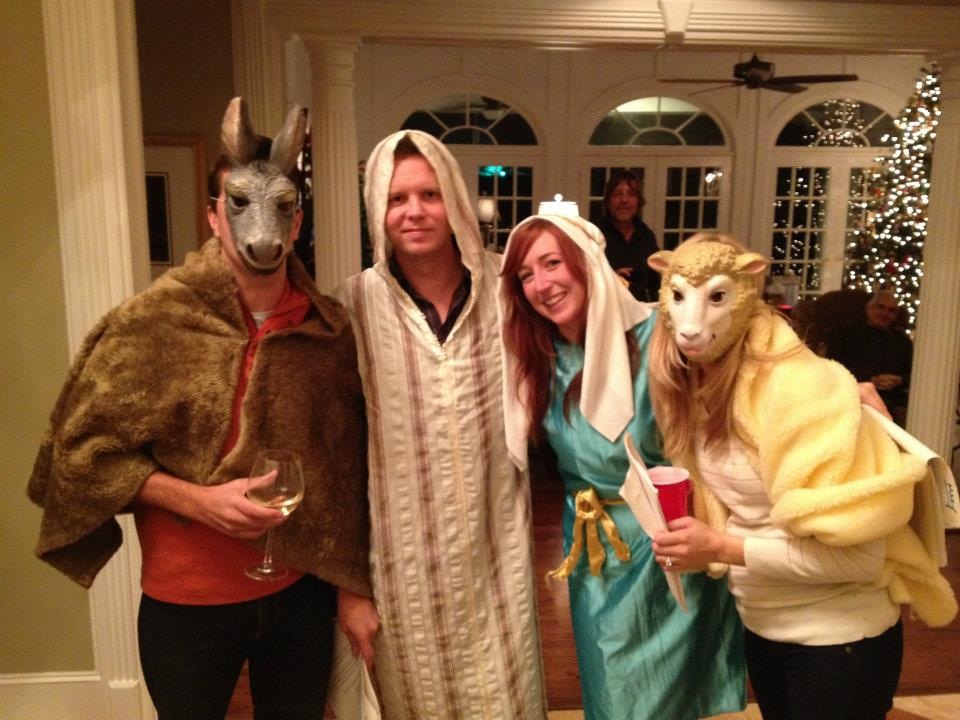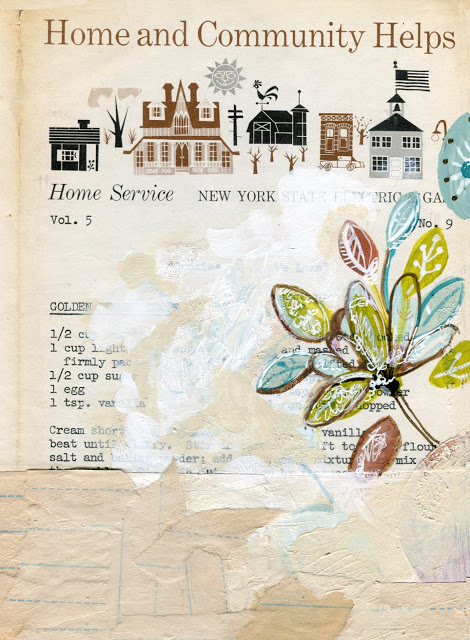
By Shaun Anzaldua
Ahh, the Pageant. My family’s greatest Christmas tradition was the product of my mother’s desperate struggle against in-laws for the rights to Christmas Eve. When the Pageant was born, twenty-five years ago, my brother Larkin and I were my mother’s only adult children who lived close enough for her to realistically expect to see us every Christmas. We both married into families with strong cultural and religious customs surrounding the holidays. Our new families always gathered Christmas Eve for tamales, empanadas, presents, and church. Both of our in-laws are Catholic, the divas of ritual and tradition. On Christmas Eve they attended midnight mass, complete with incense and holy water. Our own Christmas Eve traditions had been less predictable. We were raised Quakers, so we had no midnight mass of our own. Some years we crashed the service at one of the local churches; some years we didn’t. Most years my mother would try to coax us into singing Christmas carols, but once we became teenagers, Christmas Eve involved spiked eggnog and going out more than family togetherness. Not that my mother ever gave up trying. All in all, our family customs most certainly lacked the strength and conviction of our spouses’.
For the first several years of our marriages, Larkin and I tried to squeeze my mother into our holiday plans, but we rarely made it to her house on Christmas Eve to sing carols or drink hot cider. She was struggling against the bond between our spouses and their families, their mothers in particular. It was like pitting Elmer’s School Glue against Gorilla Glue, an unfair contest by any measure. However, my mother is the little bulldozer that could. She is, as she will often say, a problem solver. She wanted to ensure that we would feel the same inexorable pull to her at the holidays that our spouses felt towards their mothers. She understood that what she needed was a compelling event that could carry the weight of Mary in a manger, holding dear baby Jesus, five pounds, six ounces, wrapped in a swaddling cloth.
And so, the Pageant. It was the story of the Nativity, to be performed on the evening before Christmas Eve. It started off small. Just the family, a few bathrobes and ties around our heads for the shepherds, a nightgown and shawl for Mary, and a plastic gold crown for King Hared. And scripts. My mother had written scripts for each of us. But overall the production was quick, simple, no room at the inn, star rises in the east, Mary has a baby, sing a few carols, and it’s done.
The second year, my mother wanted to add depth and earnestness to the evening.
“Wouldn’t it be great if each of us brought a gift for Jesus?” she said enthusiastically. “Just like the wise men!
“I could tell a story! Larkin could play a song on his guitar!” she continued with truly disturbing glee. She was blind to the looks of horror on all of our faces.
My sister-in-law once removed (I believe that’s the technical term for the sister of a sister-in-law) was sixteen and a cheerleader at the time.
“Jen, how about you bring a cheer for baby Jesus?” my mother asked.
At sixteen, Jen did not yet have the wisdom or perspective see the golden opportunity in front of her. My beloved Never-Here-at-Christmas-Because-He-Lives-in Los-Angeles brother Josh, when told this story many years later, immediately rose to the occasion that Jen had passed over.
“Give me an ‘N’! Give me an ‘A’! Give me an ‘I’! Give me an ‘L’! Give me an ‘S’! What’s that spell? NAILS!!’“ Josh cheered as he flung himself against the wall in the shape of a crucifix. Josh is decidedly not Christian. My Catholic middle school–aged daughters nearly wet their pants at this, and instantly decided Uncle Josh was the coolest person they’d ever known. The nuns at their school were less taken with the cheer when the girls performed it for their friends at school after the holiday break.
But Jen was just a teenager at the time and could only roll her eyes and say, “Ah, yeah. Great. I’ll get right on that Mrs. Stallings.”
I wish I could say that we entered into this yearly production willingly, lovingly, and with true holiday spirit. The truth is there was much rolling of eyes from all of us and whispers of how bossy my mother can be. But despite our resistance, she never gave up and, in fact, her zeal and resolve seemed to grow with every passing year. So while there were no cheers for baby Jesus, we did put on the robes and the ties around our heads and said our lines with as much sincerity as we could muster. We siblings do like to amuse ourselves however, so we lightened our load by adding in lines like “And Mary rode Joseph’s ass all the way to Bethlehem,” and “We three kings of orient are, smoking on a loaded cigar.” My mother was too immersed in her role as director and producer to notice.
Over time the production became more and more elaborate. We invited friends, especially ones we could sucker into playing parts. We added real costumes with tunics and headpieces, feathered angel wings, sound effects (God on a boom box), and even a balloon star that did indeed rise … from behind the piano.
One year, ashamed of my bad attitude and failure to see the beauty in this humble play, I promised myself that my gift to my mother would be to surrender to the season and enter into the event with true love and kindness. I was doing well until we had to take a trip to the costume shop to buy new shepherd’s staffs and donkey masks and, for goodness sake, a new crown for Hared. The first store didn’t have good shepherd’s crooks and frankly their crowns looked cheap. We needed to go to the costume store on the other side of town. It was the height of the Christmas shopping season and traffic was snarled. Every station on the radio was playing stale Christmas carols sung by barking dogs. I desperately wanted to abandon the quest, but my mother was high on Pageant crack, and nothing was going to stop her.
I tried. I really tried. But I reached my limit, forgot my promised gift and screamed like a nasty teenager. “It’s a fucking pageant! A pageant we do in the fucking entry way of my house!” So much for true love and kindness.
My mother ignored my bad mood and on to the costume store we went.
As our children grew, much of the Pageant burden shifted to them. They advanced from sheep and donkeys to speaking parts. Heaven help the granddaughter foolish enough to bring home a boyfriend to play in our reindeer games because she was sure to be cast as Mary and her bewildered boyfriend as Joseph. Nothing cements a fragile adolescent romance like having to play an unwed pregnant teenager and her new baby daddy in front of an audience.
When the children were little, they looked forward to the Pageant and entered into it with joy. They were serious and studied their parts and had to be sure their costumes were just right. Then the grandchildren invariably hit an age where the only way to get them to participate was to say through clenched teeth, “Do you want to break Grandma Jane’s heart? Do you? Do you want to be the one to ruin Christmas?” Later they go would off to college and begin to miss the symbols of childhood, and return, ready to mock and make snarky remarks with the rest of us. The year my mother turned eighty, we took the Pageant on the road and performed it in a little community center in the rural California town where my mother had moved. We graduated beyond the entryway of my house to a theater with a real stage. Her birthday guests never knew what hit them.
The Pageant successfully fulfilled my mother’s purpose. For over two decades, she had a night all her own: a night that transcended Christmas Eve. She took it on like a Broadway pro. Each year she lovingly brought out and ironed the costumes, fluffed up the angel wings, and replaced the crooks that had been turned into swords or chewed by the dogs. She reviewed the scripts and assigned the parts and looked forward to an evening surrounded by family.
My mother is eighty-three this year, and travelling from California to Texas has become harder for her. For the last two years, she has lived in a retirement community where she has made a lovely circle of friends. This year, she told us she would not be coming at Christmas, and could we please send the costumes and scripts out to her. She has a whole new cast to direct, a group that will likely do much less eye rolling and complaining under their breath. I like to think of her and her elderly friends dressed as angels and shepherds and sheep. I wish I could be there to hear the lucky woman who gets to speak Mary’s line about never having been with a man. In spite of my pettiness, the Pageant has come to mean Christmas to me. It has been a constant in my children’s lives. Some years annoying, other years joyful, but always there. A thread that bound my family to my mother, year after year. I thought it was forever, just as I would like to believe my mother is forever.
Maybe this year I’ll try to guilt my teenagers into wearing bathrobes and scarves. I am not the powerhouse that my mother is, but it’s worth a try. I think I won’t ask them to make up any cheers. At least not this year.
•••
SHAUN ANZALDUA has a graduate degree from the University of California at Davis. She is a writer and real estate agent. Shaun currently lives in Houston with her three teenage children. She is a contributor to Brain, Child and is currently working on a collection of essays.

 Follow
Follow
